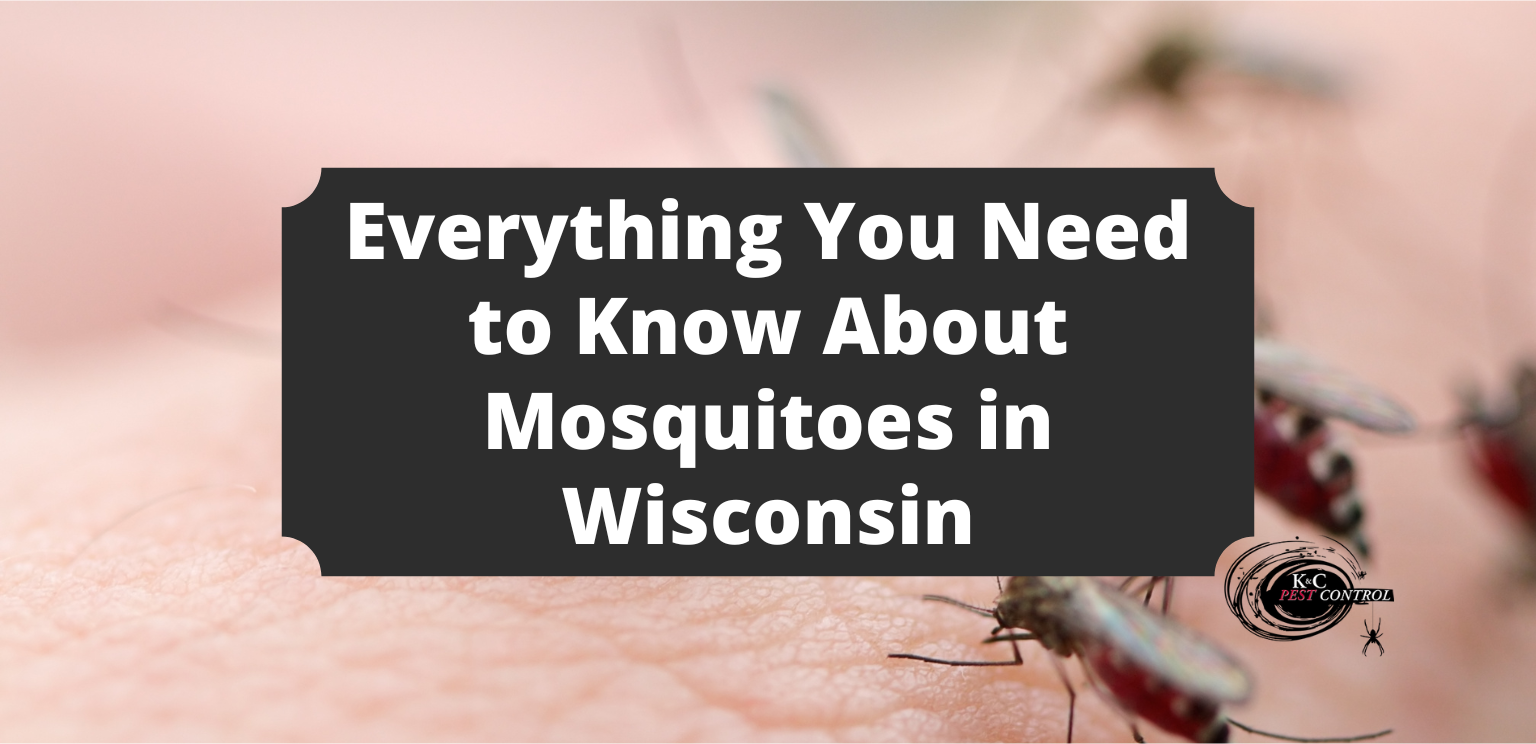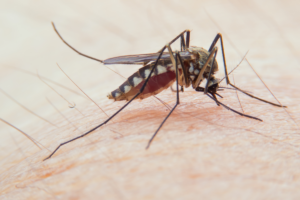Everything You Need to Know About Mosquitoes in Wisconsin

Warm weather, humidity, and thunderstorms in Wisconsin bring mosquitos that bite and annoy us throughout the spring and summer months.
While K&C Pest Control doesn’t spray for mosquitoes we want to keep you and your family safe this spring and summer so we’ve put together a list of everything you need to know about mosquitoes and the common symptoms and illnesses you could develop when bitten.
What Are Mosquitoes?
Mosquitoes are very common pests that reproduce and live in most parts of the United States.
There are many different types of mosquitoes that inhabit Wisconsin. According to research from the University of Wisconsin-Madison, Wisconsin is home to 56 species of mosquitoes.
Some of the most common mosquitoes in Wisconsin include the Inland Floodwater Mosquito, Woodland Mosquito, and the Northern House Mosquito.

Inland Floodwater Mosquito (Aedes Species)
The Inland Floodwater Mosquito often reproduces in large numbers, especially in wet environments. As it rains, you’ll see an increase in the number of mosquitoes around your home.
Floodwater Mosquitoes are often aggressive, traveling more than 10 miles from their breeding location to a blood source. Their bite is painful and more noticeable than other mosquitoes in Wisconsin, and they bite more humans than any other species.
Woodland Mosquito (Aedes Species)
This mosquito species is particularly common in spring in wooded areas. You’ll often find these mosquitoes on hiking trails and when camping or exploring wooded areas.
Woodland Mosquitoes are another aggressive species that will try to bite your face, hands, and other areas of exposed skin while you’re walking, biking, or running on rustic trails.
Northern House Mosquito (Culex Species)
The Northern House Mosquito is another common mosquito in Wisconsin.
This mosquito species reproduces in wet, damp areas, including ditches, catch basins, untended swimming pools, bird baths, ponds, and other standing water locations. Once it rains in Wisconsin, you’re more likely to see and be bothered by Northern House Mosquitoes.
They’re a known transmitter of the West Nile Virus, making them potentially dangerous to humans if you don’t take the proper precautions of protecting your skin with clothes or bug sprays.
How Long Do Mosquitoes Live?
Mosquitoes live for two to four weeks as they go through their four life cycle stages — egg, larva, pupa, and adult.
The female mosquito will lay its eggs on the surface of water or near it. The eggs will hatch after coming in contact with the water, allowing mosquitoes to easily maintain their species when it’s wet in Wisconsin.
Once the eggs hatch, they’ll feed and change into pupas once they have enough energy. They’ll quickly develop into adult mosquitoes, and survive depending on the species and the environmental conditions.
As the mosquitoes feed on blood meals, they’ll reproduce and start the cycle over again throughout the late spring and summer seasons.
Are Mosquitoes Dangerous to Humans?
While mosquito bites are annoying and itchy, most people are fine and don’t experience any serious, lasting issues.
However, in some cases, mosquitoes can spread disease and cause painful bites that require medical attention. It’s important that Wisconsinites know what to look for.
When to Seek Medical Attention for Mosquito Bites
Some common signs that you’re having an allergic reaction or should seek medical attention regarding a mosquito bite include:
- Trouble breathing
- Swelling in your throat, face, lips, tongue, or more that have not been directly bitten by the mosquito
- Hives
- Nausea and vomiting
- Wheezing
- Dizziness
Mosquito bites can also become infected, causing:
- Fever
- Chills
- Nausea
- Swelling
- Blisters or pus from the bite site
Mosquitoes can be dangerous to humans beyond these symptoms. In serious cases, they’ve infected people with the West Nile virus, Zika virus, malaria, and more over the years.
Only some types of mosquitoes can spread these illnesses, including the Aedes, Culex, and Anopheles species. These mosquitoes are found in Wisconsin and can affect humans.
In a study from The University of Wisconsin-Madison, common illnesses in Wisconsin include the West Nile Virus, La Crosse virus, and the Jamestown Canyon virus.
This West Nile Virus infects one in five people, and they often don’t know they’re sick. Those infected will develop a fever and common illness symptoms, such as tiredness, that they’ll easily recover from. One in 150 people will develop more serious symptoms, trouble breathing, swelling, and more, sometimes even becoming fatal without the proper treatments.
How to Keep Yourself Safe From Mosquitos
If you are spending time outdoors, ensure you’re taking proper precautions to prevent mosquito bites and more serious reactions.
- Spray yourself with bug spray.
- Decrease the time spent outdoors, especially around damp areas where mosquitoes reproduce.
- Protect your skin by minimizing exposure with long-sleeved shirts and pants.
- Use citronella candles and other natural oils to deter mosquitoes in the areas you plan on spending time outside.
- Minimize standing water by dumping out lawn decor that has collected rainwater and regularly cleaning bird baths and swimming pools.

How to Get Rid of Mosquito Bites Quickly
According to the Centers for Disease Control and Prevention, to get rid of mosquito bites quickly, you’ll want to wash the bite with warm soap and water and apply an ice pack for 10 minutes to reduce swelling and itchiness.
Purchasing over-the-counter itch medicine or antihistamine cream can also quickly reduce the effects of a mosquito bite.
At home, you can also try mixing baking soda and water together to create a paste to reduce itching. Apply the paste to the bite and wait for 10 minutes before washing it from the area.
Natural oils can also help to relieve bug bite itchiness and pain also. Try peppermint oil, which has a cooling effect on the skin. Tea tree oil can also help prevent bacteria which could cause your bite to become infected.
Does K&C Pest Control Spray for Mosquitoes?
K&C Pest Control DOESN’T spray for mosquitoes. However, we want to keep you and your family safe this spring and summer.
Contact a mosquito control professional in your area to reduce the risk of mosquitoes reproducing around your home.
K&C Pest Control can help you with your ant, wasp and yellow jackets, spider treatment, and other bug and rodent services this spring and summer. Contact our pest control professionals for assistance today!
